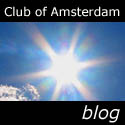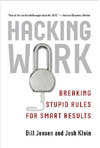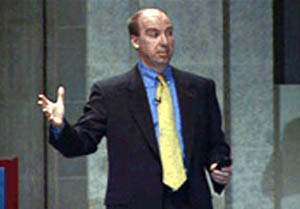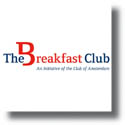
Welcome to the Club of Amsterdam Journal.
30/09/2010 “There is a clear increase in the number of cyber crimes – from attacks against countries like Estonia in 2007 to more of an every day illegal activity, where felonies such as credit card thefts, money transfers, identity thefts, and industrial espionage is carried out by a new type of criminals. By using so called botnets, criminals can take control of computers all over the world. These stories seem like science fiction, but they are unfortunately the reality of an increasingly lucrative business”, said EU Commissioner Cecilia Malmström.
Join our event about the future of Hacking, October 14th, 18:30-21:15!
Felix Bopp, editor-in-chief
Web Hacking Incident Database
The Web Hacking Incident Database 2010
Semiannual Report
January to June 2010
by Ryan Barnett, Fellow WASC officer
A few Report Summary Findings –
- A steep rise in attacks against the financial vertical market is occurring in 2010, and is currently the no. 3 targeted vertical at 12 percent. This is mainly a result of cybercriminals targeting small to medium businesses’ (SMBs) online banking accounts.
- Corresponding to cybercriminals targeting online bank accounts, the use of Banking Trojans (which results in stolen authentication credentials) made the largest jump for attack methods (Banking Trojans + Stolen Credentials).
- Application downtime, often due to denial of service attacks, is a rising outcome.
- Organizations have not implemented proper Web application logging mechanisms and thus are unable to conduct proper incident response to identify and correct vulnerabilities. This resulted in the no. 1 “unknown” attack category.
See Web-Hacking-Incident-Database
The Web Hacking Incident Database Update for 2009 by Ryan Barnett at the OWASP AppSec DC Conf 2009
Next Event

the future of Hacking
Thursday, October 14, 2010
Registration: 18:30-19:00, Conference: 19:00-21:15
Location: Hogeschool van Amsterdam, Auditorium, Singelgrachtgebouw, Rhijnspoorplein 1, 1091 GC Amsterdam
Frans Kolkman, Head High Tech Crime Unit East-NL
The future of Cybercrime and arresting Hackers
Martijn Aslander, lifehacker, connector and resourcerer
How to connect hacking with the possibilities of the network and information age
Alper Çugun, Intendant, Monster Swell
Civic duty in a hyper-connected world
Moderated by Arjen Kamphuis, Co-founder, CTO, Gendo
In collaboration with Hogeschool van Amsterdam & Freelance Factory
The Future of the Nuclear Fuel Cycle
MIT study finds no shortage of uranium for nuclear energy for decades, but more research is needed to develop improved fuel-cycle options.
In 2003 MIT published the interdisciplinary study The Future of Nuclear Power. The underlying motivation was that nuclear energy, which today provides about 70% of the “zero”- carbon electricity in the U.S., is an important option for the market place in a low-carbon world. Since that report, major changes in the US and the world have taken place as described in our 2009 Update of the 2003 Future of Nuclear Power Report. Concerns about climate change have risen: many countries have adopted restrictions on greenhouse gas emissions to the atmosphere, and the U.S. is expected to adopt similar limits. Projections for nuclear-power growth worldwide have increased dramatically and construction of new plants has accelerated, particularly in China and India. This study on The Future of the Nuclear Fuel Cycle has been carried out because of the continuing importance of nuclear power as a low-carbon option that could be deployed at a scale that is material for mitigating climate change risk, namely, global deployment at the Terawatt scale by mid-century.
To enable an expansion of nuclear power, it must overcome critical challenges in cost, waste disposal, and proliferation concerns while maintaining its currently excellent safety and reliability record. In the relatively near term, important decisions may be taken with far reaching long-term implications about the evolution of the nuclear fuel cycle – what type of fuel is used, what types of reactors, what happens to irradiated fuel, and what method of disposal for long term nuclear wastes. This study aims to inform those decisions.
For decades, the discussion about future nuclear fuel cycles has been dominated by the expectation that a closed fuel cycle based on plutonium startup of fast reactors would eventually be deployed. However, this expectation is rooted in an out-of-date understanding about uranium scarcity. Our reexamination of fuel cycles suggests that there are many more viable fuel cycle options and that the optimum choice among them faces great uncertainty – some economic, such as the cost of advanced reactors, some technical such as implications for waste management, and some societal, such as the scale of nuclear power deployment and the management of nuclear proliferation risks. Greater clarity should emerge over the next few decades, assuming that the needed research is carried out for technological alternatives and that the global response to climate change risk mitigation comes together. A key message from our work is that we can and should preserve our options for fuel cycle choices by continuing with the open fuel cycle, implementing a system for managed LWR spent fuel storage, developing a geological repository, and researching technology alternatives appropriate to a range of nuclear energy futures.
Visit to CERN

The Club of Amsterdam organises a visit to CERN in Geneva, Switzerland. It will be a 1-day trip in January or February 2011.
For more information, please send us an email.
Club of Amsterdam blog

Club of Amsterdam blog
http://clubofamsterdam.blogspot.com
October 6: The Girl
October 6: Life
October 6: The Bird
October 6: Deep Diving
October 6: Shadows
October 6: Darkness
October 6: An Execution
June 16: Leadership
May 14: Sustainable Technologies for the Next Decade
May 10: What is the future of natural gas in Europe?
April 8: The Dawn of the Intelligent Planet
News about the Future

Renewables 2010 Global Status Report
In 2009, for the second year in a row, both the US and Europe added more power capacity from renewable sources such as wind and solar than conventional sources like coal, gas and nuclear, according to twin reports launched today by the United Nations Environment Programme and the Renewable Energy Policy Network for the 21st Century (REN21).
Renewables accounted for 60 per cent of newly installed capacity in Europe and more than 50 per cent in the USA in 2009. This year or next, experts predict, the world as a whole will add more capacity to the electricity supply from renewable than non-renewable sources.
The reports detail trends in the global green energy sector, including which
sources attracted the greatest attention from investors and governments in different world regions.

Global Entrepreneurship and Development Index
SBA, USA released a new study that analyzes entrepreneurship at the global level using a new index called the Global Entrepreneurship and Development Index (GEDI). This index captures the contextual (qualitative and quantitative) features of entrepreneurship in 71 countries.
Recommended Book

Hacking Work: Breaking Stupid Rules for Smart Results
by Bill Jensen and Josh Klein
Why work harder than you have to? One manager kept his senior execs happy by secretly hacking into the company’s database to give them the reports they needed in one third of the time. Hacking is a powerful solution to every stupid procedure, tool, rule, and process we are forced to endure at the office. Benevolent hackers are saving business from itself.
It would be so much easier to do great work if not for lingering bureaucracies, outdated technologies, and deeply irrational rules and procedures. These things are killing us.
Frustrating? Hell, yes. But take heart-there’s an army of heroes coming to the rescue.
Today’s top performers are taking matters into their own hands: bypassing sacred structures, using forbidden tools, and ignoring silly corporate edicts. In other words, they are hacking work to increase their efficiency and job satisfaction. Consultant Bill Jensen teamed up with hacker Josh Klein to expose the cheat codes that enable people to work smarter instead of harder. Once employees learn how to hack their work, they accomplish more in less time. They cut through red tape and circumvent stupid rules.
For instance, Elizabeth’s bosses wouldn’t sign off on her plan to improve customer service. So she made videotapes of customers complaining about what needed fixing and posted them on YouTube. Within days, public outcry forced senior management to reverse its decision.
Hacking Work reveals powerful technological and social hacks and shows readers how to apply them to sidestep bureaucratic boundaries and busywork. It’s about making the system work for you, not the other way around, so you can take control of your workload, increase your productivity, and help your company succeed-in spite of itself.
Contribution to the “GLOBAL NGO FORUM FOR WOMEN BEIJING + 15”
February 2010

By Rosana Agudo
Founder of the NGOs Lur Gozoa and Mirra
Yesterday was a sad day, a grey day, a day of desperation, an absurd day, a day to witness with clarity the chaos and the chains that bind us human beings, a day than made it enormously painful to remain seated and alert.
Present were women from a diversity cultures, of many nationalities, with many problems, and many ways of understanding them, each one of us searching for a solution, demanding a formula to relieve our suffering, caused by something outside of ourselves. It was a day to express our dissatisfaction or our pain. Above all, it was a day to make demands.
Long lines of women behind the microphones spoke of their unhappiness, their lack of trust, their pain, and their problems…. But, above all, what could be seen was the need, the enormous need, to identify a guilty party, and to access a channel by which to transmit our dissatisfaction and our suffering.
As an example, for some women the guilty party was religion. If there were no religions, or, at least, if these were separated from the state, our problems would “almost” be solved. For others, it was the imposition of other cultures, supposedly the Western Culture, which believes it holds a monopoly on the meaning of progress, and that democracy is the panacea for solving the world’s problems. For others, the subject goes deeper, having to do with being respected as women, even among women; one demanded her right to be there and to be taken into account, refusing to allow her wheelchair to pose a handicap to her presence as a woman.
But for all present and without a doubt, the patriarchy was the guilty party. The word sounded constantly in the auditorium, incarnating the powerful figure responsible for all our troubles.
We don’t know our jailer and this gives him power. Men don’t know him either. They are just as trapped as we are, or more so, if that were possible, because some of them really believe that they are the patriarchs and act accordingly, they are the best instruments through whom the authentic patriarch works; these men make his most faithful servants. He flatters them and they become his marionettes, giving or withholding grace, and believing themselves to be the owners of the world. Other men believe they are his friend and that they are entitled to do what they will as long as the benefits, whatever form they take, increase the power of the one who is really in charge. Others fear the patriarch, and don’t dare to look him in the eye or to question his power. They prefer not to anger him. Some men rebel, but only a few; but the patriarch speaks to them and assures them that they are the chosen ones, the dominate gender of the dominate species.
But who is this patriarch? What is the patriarchy? Has anybody seen “him” o “it”? To whom or to what are we placing our demands, presenting our petitions, asking for justice? When we women elaborate our final document for this meeting, incorporating our petitions, our demands or our solutions for a more just world for ourselves and our children, to whom are we going present it? Who do we want to listen to us, who do we want to plead our case in our campaign for justice and balance? The patriarch? The patriarchy? Its representatives? Its employees? Its servants?
But I insist. We don’t know our jailer and this gives him power. He is hidden behind each one of us, and each of us has given him a name and a gender. He is hidden behind each culture and each has given him an identity. He is hidden in every stage of human history and every epoch has given him a name. He is hidden and takes on different forms depending on who is looking and when. He is the guilty one and this frees us from our own guilt, but, at the same time, he ties us to guilt because we generate guilty parties, we need guilty parties.
Yesterday, among women, the guilty one was “the patriarch”, whatever that meant for each woman present in the auditorium, and surely, for each of us “the patriarch” had a different meaning, name, color, and even nationality. Curiously, however, the patriarch spoke through each of us; we spoke his language, the language that he taught us to speak.
We are asking solutions from the same “character” that creates our problems in the first place, and the solutions he gives are solutions that perpetuate the problems. Sometimes we are captured by the fantasy that the patriarch is actually going to solve something, but this is precisely his strategy: he lives on by providing solutions for the very problems he creates and this allows him to continuously refine his machinery. He has us trapped in his game; he plays with us, increasing his power at a pace commensurate with the growing complexity of his machinery. And by his action, he saps our joy, passion, brilliance, color…. Please, we cannot allow him to speak for us or to speak through us.
We must learn to recognize his game, and to detect his presence in our language that reveals what we are thinking, the content of our thoughts, our mental model, and the emotions that we receive and emit.
The one we have named “the patriarch” or the “patriarchy” is none other than our mental model, our mind set. It is made up of beliefs and suppositions, about what is and what should be. It generates emotions according to whether or not the specified expectations have been satisfied, and according to whether or not our immediate needs are being attended to. In this way we adopt a behavior, in the form of laws, decrees, treaties etc. that seal once again the mental model, adding new ideas to the same mechanism. This is how the mental model evolves in refinement and complexity, becoming evermore clever.
Powerful men (men are almost always the powerful ones), and the ones through which the patriarch works most visibly, know well the options at their disposal for flattering in some cases and for terrifying in others entire societies with the aim of tricking them or convincing them in order to protect the interests of the most powerful. Unwittingly, these men are being utilized directly by the patriarch, even though, as we have seen, they are convinced that they are the patriarchs. These men are the most enslaved of all. Their mental model is so closed by unquestioned laws, by inflexible structures and ways of doing things, and by addictions of every kind, that they dedicate their life to serving the mental model that gives them exactly what it needs to perpetuate itself.
In the planet, a species is evolving by way of the mind, that is, the human species. Men and women are evolving by way of the evermore-refined machinery of our minds that creates networks of evermore-complex thoughts that create, in turn, more and more complex realities. In the end, the subtle and refined strategy of what we call “the patriarchy” is that, far from offering solutions in accordance with its capacity to create complex networks of problems, it takes away our ability to find solutions because it has determined, to complicate things even more, and taking into consideration that we are emotional creatures, to gives us the tool of guilt that we can pass around among ourselves such that he can enjoy himself at our expense.
Therefore, as always, our expectations as to how our petitions should be attended depend directly on whether or not they coincide with the necessities of the mental model, of the patriarch. Our expectations as to how our petitions should be attended depend on whether or not the satisfaction of our demands is going to satisfy the patriarch’s own objectives.
We can no longer depend on him.
Empowerment doesn’t mean just acknowledging one’s own power, or reclaiming the right to exercise it. Empowerment also means putting this acknowledgment into action. When a woman is empowered, when a woman exercises her rights, in accordance with the circumstances of the moment, not as a demand but as the manifestation of her entitlement, when a woman becomes aware of her abilities as well as her limitations, she frees herself from conventional thought, the stomping ground where the patriarch roams freely without being seen or recognized, then she is free to act in a different way and to begin to elaborate her own strategy.
For things to change, for the emergence of our own new strategy, we must change our mental model so that it doesn’t complicate life at a greater velocity than our ability not just to find the solutions but even to detect the problems.
But before we can change something, we must first get to know it, to learn how it works. We can’t change what we don’t understand. Our future depends on our getting to know our mental model, how it creates our reality and our way of seeing the world. Our future depends on how we react to this new knowledge. It seems that we women are the ones who are best prepared to undertake this work. Having detected the “glass ceiling”, we can now convert this once invisible obstacle into a catapult towards freedom. But we must free ourselves and at the same time offers freedom. It is our destiny. We cannot free only ourselves, they, men must come with us as well. To liberate is the privilege of the liberated.
Can we stop petitioning the patriarch and continue our “third liberation” with the strength of our empowerment and of our capacity for compassion and empathy? This third revolution or liberation will be a giant leap not just for women or for society, but for all of us as a species, with consequences we can’t yet imagine.
This liberation from the oppressive mental model with its rigid dual reality, offers us a global awareness that, at present, we can only envision through our aspirations, which heretofore have only been expressed in the form of pleas for liberation from injustice.
Let us dare to create our future and that of the generations to come from our vision, and from our maturity as human beings. Let us create networks from which we can unite and join forces towards our common aspiration. Let us also dare to overcome our common enemy, ourselves.
Let us not defend ourselves against each other. We have the power to generate the next way of relating to each other as human beings, and as human beings to the Planet Earth and to all the life it shelters; we have the power to bequeath this new form of relationship to the generations of men and women that will inhabit the world we are helping to create.
TTi-Tecnología para la Transformación Interior (Technology for Internal Transformation)
145 new species described in the Greater Mekong

A seven meter tall carnivorous plant, a fish with vampire fangs, and a frog that sounds like a cricket are among 145 new species described last year in the Greater Mekong, reaffirming the region as a one of the most significant biological hotspots on the planet ahead of the UN Convention on Biological Diversity (CBD) in Nagoya, Japan.
New Blood: Greater Mekong new species discoveries 2009, reveals an average of three new species recorded by science each week including Asia’s only bald songbird the Bare-faced bulbul and the uniquely adapted Sucker-fish, which uses its body to sucker onto rocks in fast flowing waters to move upstream.
“This rate of discovery is simply staggering in modern times,” said Stuart Chapman, Conservation Director of WWF Greater Mekong. “Each year, the new species count keeps going up, and with it, so too does the responsibility to ensure this region’s unique biodiversity is conserved,” he said.
The report says while these discoveries highlight the Greater Mekong’s immense biodiversity it also pinpoints the fragility of this region’s diverse habitats and species. The likely local extinction of the Javan rhino in Vietnam is one tragic indicator of the decline of biodiversity in recent times.
Other new species standouts that were discovered in this region that comprises Cambodia, Laos, Myanmar, Thailand, Vietnam and the southern province of Yunnan in China include five new mammal species, two bats and three shrews, a poisonous pit viper and an entirely new genus of fang-less snake.
The report highlights the opportunity for governments of the Greater Mekong to use financing through the Global Environment Facility (GEF), the global financing mechanism for the CBD, to leverage large-scale resources to conserve species, biodiversity and healthy ecosystems across the region.
“Biodiversity is not evenly distributed around the globe. These new species are a timely reminder of the extraordinary biodiversity in the Greater Mekong,” said Mr Chapman. “Therefore a greater allocation of funds is needed to ensure these valuable ecosystems are conserved.”
At the CBD, WWF will promote opportunities for the Global Environment Facility to provide financing for a trans-boundary programme in the Greater Mekong that recognizes the role of biodiversity and healthy ecosystems.
New discoveries in the Greater Mekong from WWF on Vimeo.
Futurist Portrait: Jack Uldrich

Jack Uldrich is a renowned global futurist, independent scholar, sought-after business speaker, and best-selling author. His books include the best-selling, The Next Big Thing is Really Small: How Nanotechnology Will Change the Future of Your Business, and the award-winning, Into the Unknown: Leadership Lessons from Lewis & Clark’s Daring Westward Expedition. His latest book is Jump the Curve: 50 Essential Strategies to Help Your Company Stay Ahead of Emerging Technologies.
Mr. Uldrich’s other written works have appeared in The Wall Street Journal, BusinessWeek, The Futurist, Future Quarterly Research, The Wall Street Reporter, Leader to Leader, Management Quarterly, and hundreds of other newspapers and publications around the country. He is also a frequent guest of the media worldwide – having appeared on CNN, MSNBC, and National Public Radio on numerous occasions.
In addition to speaking on future trends, emerging technologies, innovation, change management and leadership, Uldrich is a leading expert on assisting businesses adapt. He has served as an advisor to Fortune 1000 companies and is noted for his ability to deliver provocative, new perspectives on competitive advantage, organizational change and transformational leadership.
Highly regarded for his unique ability to present complex information in an entertaining, understandable and digestible manner that stays with his audiences long afterwards, Uldrich has spoken to hundreds of businesses and organizations, including General Electric, General Mills, the Young Presidents Organization (YPO), Pfizer, Invitrogen, St. Jude Medical, AG Schering, Imation, Fairview Hospitals, Touchstone Energy, The Insurance Service Organization, The National Kitchen & Bath Association, The National Paint & Coatings Association and dozens more.
Jack Uldrich is also known for his willingness to work with clients well in advance of his presentations in order to deliver highly tailored presentations that are guaranteed to help his clients not only profit today, but continue to prosper long into the future.
Agenda
| Season Program 2010/2011 | ||
| October 14, 2010 18:30-21:15 November 25, 2010 18:30-21:15 | | the future of Hacking Location: Hogeschool van Amsterdam, Auditorium, Singelgrachtgebouw, Rhijnspoorplein 1, 1091 GC Amsterdam the future of Happiness Location: Hogeschool van Amsterdam, Auditorium, Singelgrachtgebouw, Rhijnspoorplein 1, 1091 GC Amsterdam |
| January 20, 2011 18:30-21:15 | the future of Financial Infrastructure | |
| February 17, 2011 18:30-21:15 | the future of Services | |
| March 17, 2011 18:30-21:15 | the future of Shell | |
| April 14, 2011 18:30-21:15 | the future of the Human Mind | |
| May 19, 2011 18:30-21:15 | the future of the Singularity | |
| June 23, 2011 18:30-21:15 | the future of European Democracy | |
 |







Customer Reviews
Thanks for submitting your comment!